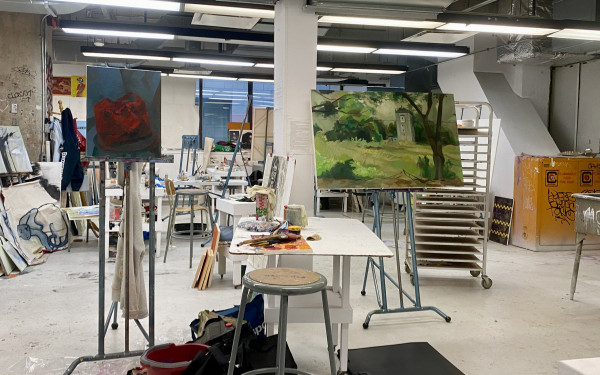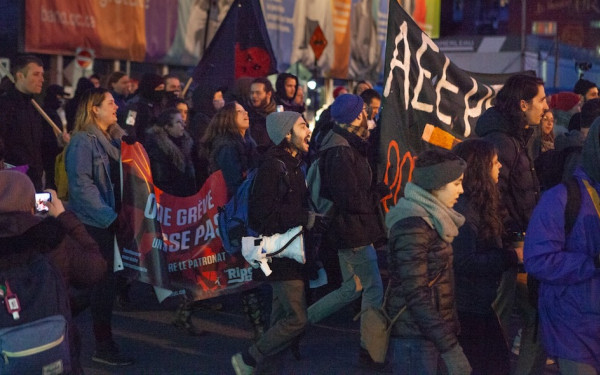Immigrants Not Being Able to Read Their Hydro Bill Won’t Save the French Language
Jolin-Barrette’s Proposal to Limit Access to Services in English Is a Lazy Move
First, they came for the hijabs.
As a woman in a free country, believing I could wear anything I want and still deserve equal opportunities, I was upset.
I was wrong to take freedom of expression for granted.
Even a woman who looks like the Québécoise de souche of the provincial government’s dreams was intimidated out of the Blue Room of the National Assembly, her workplace, for dressing too casually.
Her wardrobe choices also drew complaints because she wore a skirt for Halloween in a photo taken at her workplace.
Decorum is apparently code for “social expectations of women,” and apparently no matter how well-spoken a woman is, her wardrobe choices are infinitely more important and newsworthy.
This might be one of the rare things Quebec’s Liberals and the Coalition Avenir Québec agree on, albeit they disagree on the method employed in order to police women’s dress.
It should be clear that there is no dress code in the assembly, just a social expectation to dress a certain way, something women are all too familiar with.
Unsatisfied with just coming for the hijabs and women who wear Docs in the assembly, our government decided that wasn’t enough.
They came for the immigrants too.
The CAQ wanted to reduce the number of immigrants despite a skilled worker shortage.
Quebec toyed with its immigration policy, sending thousands of applications into purgatory.
Immigration Minister Simon Jolin-Barrette told his ministry to stop processing people’s applications, representing hours they invested in filling them with their dreams of a better future, despite his reforms not even being passed yet.
Ultimately, the government proceeded under the old rules as it was supposed to, but what this taught us was the sheer impunity and disregard the CAQ has for process.
All populism, no substance, is the name of the game.
When the government recently announced its changes to the CEQ, I was ready to see the utter devastation it was prepared to create in order to achieve its nationalistic goals.
Then they came for the international students—and left because AI is so important.
Legault said the government changed course because a few people cried and its members saw them as humans for once, but realistically, it would have acted similarly for previous moves had that been true.
There has been no shortage of tears, fears, or protests, but there has been a shortage of big business, something our entrepreneur-Premier cares about as much as nationalism.
Finally, they came for your auntie’s right to read her hydro bill.
Unless, of course, she’s part of what they call the “historic anglo community.”
Legault defines this as people who are allowed to attend English-language schools under Bill 101, which makes it unclear, still, as to who has a right to demand exceptions.
Elderly people immigrating might not be allowed to get their Revenu Québec documents in a language they can read, but people with learning disabilities or serious humanitarian situations could request exceptions.
Exemption criteria are left seemingly purposely broad, and therefore to the discretion of the sympathies of whoever is taking the accommodation requests.
Let me be clear, if the French language is threatened in Quebec, it is not because people receive government documents in English.
French is not threatened by anyone who moves here that doesn’t yet speak French, as long as they are willing to learn.
Our culture is not threatened by immigrant values, as Montreal has not suffered but thrived with multiculturalism.
A values test serves us little.
A Franco-Catholic neighbour of mine, born and raised in Quebec, might even fail this test.
Our society is already comprised of people with different opinions, and all individuals should be allowed their freedom of thought, so long as no one is using their opinions to limit the rights of others to live according to their personal convictions.
Language is the same; people can speak the language they want at home or with friends, and as long as we live in Canada (a nation of two official languages) we should all have the right to receive government forms in the official language of our choice.
I read better in English despite fluently understanding French. The convenience of getting documents in my preferred language is both my right and the right of any person who receives and pays for government services.
Older people and others with difficulties in French being forced to bring their documents to be deciphered by people who see them with contempt serves only to make them feel ashamed, dependent, and insulted.
No one would choose to live in, work in, and embrace French by being forced to read their documents in French.
This measure has no tangible effect in preserving French, contrary to what Jolin-Barrette seems to suggest.
Then what does the move serve to do? Appease the same “majority” that enjoyed seeing minority women stripped of their rights to expression under Bill 21.
The idea is to appease this “majority” who slowly feel left behind in a world moving forward, people who closetedly resent minorities, wishing they could wake up one day and see everyone who isn’t like them disappear to achieve this mythical uniform culture and society.
The government can’t overtly do this, but it can punish minorities that don’t assimilate “properly” with discomfort, with hostility, and with shame.
We can also see how the newly imposed measures target existing immigrant communities, making them feel uncomfortable and unwelcome by refusing to accommodate them.
The secret here is that there is no way to assimilate properly.
There are hijabi women, visible minorities, and others who speak perfect French, and they find themselves targeted in their rights to self-expression with Bill 21 or to their own private opinions with the values test.
Even if they jump through all the hurdles, the government will find a novel way to make new arrivals whiter, more francophone, less religious unless catholic, etc.
The French PhD student who was refused a selection certificate because of an English chapter in her thesis is an example.
The decision was overturned because of massive outcry and publicity.
People were upset by the notion of refusing a certificate to a French citizen, noticeably white and francophone, because they included some English in their thesis.
The frustration is that even the CAQ government’s idea of the “perfect” immigrant can be deemed insufficiently francophone, so it is thus easy to imagine how much prejudice other people would face.
This whole debacle shows how fickle the system and its selection process can be.
Without the public outcry, the French citizen may have found the decision difficult to rectify, and it may have been even harder for someone without French nationality.
We can easily piece together, then, the type of immigrants sought by the Quebec government.
We can also see how the newly imposed measures target existing immigrant communities, making them feel uncomfortable and unwelcome by refusing to accommodate them.
A person could be second-generation, first-generation trilingual, a taxpayer, and a model citizen but not be allowed to make a personal choice regarding the language in which they can receive services from the state they pay to sustain.
When we are left with a fractured economy with little population growth, will we then admit we took it too far?
Will we finally admit not enough was done when we are left in a huge labour shortage with no one to fill in the gaps?
At what point is this “silent majority” to be accommodated and what would the result look like if these tendencies were to be actual policy?
Most people who are well-read know that when a government decides to make lists of members of minority communities and when it begins to limit the rights of these minority communities, it seldom ends there.
These changes are far less innocent and far less useful than they appear. The attempt to justify them is incredibly lazy, the approach is populist, and the message is grim.
This leaves many of us to wonder what the future of Quebec will look like, and where our place is within it.






